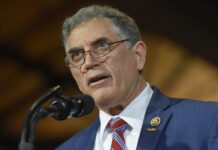
The head of Georgia’s safety net system for people with disabilities and behavioral health needs has announced she will retire after six years leading the agency.
Judy Fitzgerald, commissioner of the state Department of Behavioral Health and Developmental Disabilities, will stay on through the end of the year to allow time to name a successor – something that won’t happen until after the Nov. 8 election.
Fitzgerald’s tenure ends at a time when behavioral health has had a rare moment in the sun, with lawmakers overwhelmingly backing a bill seen as a significant step toward addressing Georgia’s poor standing when it comes to access to treatment.
As commissioner, Fitzgerald has also led the agency while it has been under a federal settlement agreement inked in 2010, when Georgia came under scrutiny for its reliance on institutional settings to serve people with mental illness or intellectual and developmental disabilities.
The state has come out from under a portion of the settlement agreement during Fitzgerald’s tenure.
“Our decade of transformation has been nothing short of remarkable,” Fitzgerald wrote in a letter to her colleagues informing them of her retirement. “And now, as the pandemic revealed unprecedented demand for access to behavioral health services and crippling workforce shortages, we must confront new challenges to advance our efforts across the state.”
Fitzgerald was appointed by former Gov. Nathan Deal and continued to serve under Gov. Brian Kemp, who will name her replacement if he wins another term this fall. She said she will work with the governor’s office to ensure a “seamless transition.”
“Judy has been a valued public servant in my administration, and Marty and I want to thank her for the years of service she has given to the people of Georgia,” Kemp said in a statement.
Gwen Skinner, a former DBHDD commissioner, said Fitzgerald deserves credit for continuing the slow work of building Georgia’s system. Under Fitzgerald, the state has grown the number of people with disabilities served, the reach of a school-based mental health program – especially in rural areas of the state – and the pool of people in recovery employed to help others who are struggling with mental health or substance use disorders.
The state is often criticized for not serving more people with disabilities who are on a wait list for home- and community-based care, which includes about 7,000 people. But Skinner noted that there are also now about 13,000 people who are being served.
“That’s more than there has ever been, and that was a building process and she carried it forward,” Skinner said. “I think she leaves in a system that is better than it was when she got there because she has continued to build it.
“And my hope is that the next person – whoever that is – will continue down some of the very same paths building what she started or what she built on from her predecessors,” Skinner added.
Despite the challenges of leading the department, Fitzgerald is unfailingly upbeat and outwardly optimistic. She is also known at the state Capitol for her careful candor.
Notably, when directed by the governor to cut spending in early 2020, she publicly warned lawmakers that there would be an impact on state services. “The safety net is stretched to the max,” Fitzgerald said at the time. Less than two months later, the first COVID-19 case was reported in Georgia, marking the start of a pandemic that would put a tremendous strain on the state’s behavioral health services.
“To have the longevity that she had but to be able to speak truth to power is a gift, and she did it and I think she did it really well,” said Neil Campbell, executive director of the Georgia Council on Substance Abuse.
Fitzgerald started her career in the 1990s as an advocate with the Carter Center Mental Health Program working for former First Lady Rosalynn Carter. She went on to work as a consultant on child and adolescent services in several states and led what is now known as Mental Health America of Georgia.
She also at one point in her career stepped into the role of a service provider, working at a community service board in Lawrenceville before becoming chief of staff to former DBHDD commissioner Frank Berry in 2012.
Her early work as an advocate shaped her leadership style.
“She really believes in the voice of lived experience,” said Campbell, who is also retiring next year. “She wanted to know all the time, ‘Hey, ok providers, I’ve got your opinion. What do the people who are receiving services think?’ And so, she was always willing to listen to us and to listen to advocates, because she had been an advocate.
“I just want people to know that she fought every day. We didn’t always agree, but she got up every day and I think fought for the people that we serve.”







